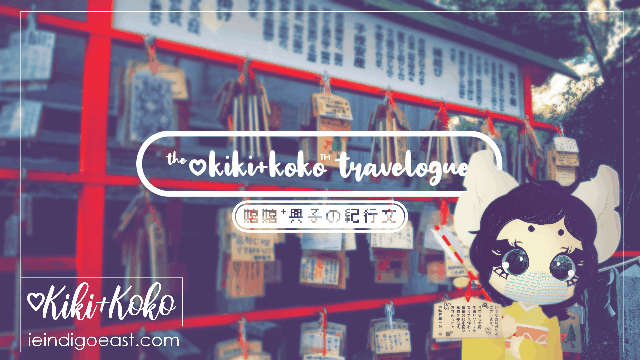 HELLO! I AM QUIZBO™!I am the computer robot friend of Kiki and Koko that you may recognise from the usual lessons, here, at Kiki+Koko: Let’s NihonGO!! Online. Though our lessons are evergreen, this is an opportunity to mention that I am currently processing Kiki+Koko’s statement concerning current events. My Heisei era hardware has limited speed and internet capabilities, but I will do my best to re-broadcast to the whole of the internet as soon as possible. In the meantime, whilst one of my processing cores are dedicated to rendering that, I can still provide a proper Word of the Week segment for you. But, What is Word of the Week? you may ask.
HELLO! I AM QUIZBO™!I am the computer robot friend of Kiki and Koko that you may recognise from the usual lessons, here, at Kiki+Koko: Let’s NihonGO!! Online. Though our lessons are evergreen, this is an opportunity to mention that I am currently processing Kiki+Koko’s statement concerning current events. My Heisei era hardware has limited speed and internet capabilities, but I will do my best to re-broadcast to the whole of the internet as soon as possible. In the meantime, whilst one of my processing cores are dedicated to rendering that, I can still provide a proper Word of the Week segment for you. But, What is Word of the Week? you may ask.
One warm summer day, a day or two after Monday, it became apparent that the gap between Monday and Friday is quite lengthy. And, whilst a rest between studying is useful, it is easy to forget to revise or get out of the habit in so many days. It was then that initiative was taken to present Japanese Word of the Week Wednesday.
Besides the more obvious function, Word of the Week Wednesday can serve as a useful reminder to go back to previous lessons and study them or see if there are any lessons you may have missed. There are almost 200 lessons available and more that continue to be created each and every week, so it is very likely that there could be some you may not have experienced. On top of this, there are useful facts and hidden material that you may not have even thought to study within the lessons under the umbrella of the main lesson. But, the only way to find out these extra pieces of information would be to have a read of the lessons. But, What happens during Word of the Week Wednesday?
 During Word of the Week Wednesday, with the assistance of Kiki and Koko, a Japanese word or phrase is chosen and presented to you with the possibility of a bonus word, as well. I provide a definition and other useful information about the vocabulary word, and if applicable, Kiki and Koko provide a helpful hint in using the word or phrase. However, that is not the whole of it. I personally sound out each word or phrase aloud for you to repeat as many times as you wish, and you can ask me to say it as many times as you wish. I will never tire of it, as it is my function.
During Word of the Week Wednesday, with the assistance of Kiki and Koko, a Japanese word or phrase is chosen and presented to you with the possibility of a bonus word, as well. I provide a definition and other useful information about the vocabulary word, and if applicable, Kiki and Koko provide a helpful hint in using the word or phrase. However, that is not the whole of it. I personally sound out each word or phrase aloud for you to repeat as many times as you wish, and you can ask me to say it as many times as you wish. I will never tire of it, as it is my function.
 From there, an example sentence is created. You can not only use the sentence to see how the word is used or to see the definition in action, but you can also use it to practise your reading and writing. You can compose your own sentence based on it; you can use it to see examples of grammar; or you can even use it to learn other adjacent vocabulary. Each sentence is written in a way that is useful to beginners through advanced learners. So, there is something for everyone. And, again, I will be there to read it aloud for you. I can only read it at one speed, so there is no need to repeat after me, but it can still assist you in picking out vocabulary within natural speeds of speech. And, if you would like to know more about how to create your own sentences, be sure to consult the grammar section of the Essentials.
From there, an example sentence is created. You can not only use the sentence to see how the word is used or to see the definition in action, but you can also use it to practise your reading and writing. You can compose your own sentence based on it; you can use it to see examples of grammar; or you can even use it to learn other adjacent vocabulary. Each sentence is written in a way that is useful to beginners through advanced learners. So, there is something for everyone. And, again, I will be there to read it aloud for you. I can only read it at one speed, so there is no need to repeat after me, but it can still assist you in picking out vocabulary within natural speeds of speech. And, if you would like to know more about how to create your own sentences, be sure to consult the grammar section of the Essentials.
And, now it is time for the essential part of this segment, which is the vocabulary! Kiki and Koko will be joining us in their Helpful Hints segment of this corner to assist in today’s vocabulary.
Without further ado, let us NihonGO!!
Word(s) of the Week:
心配【しんぱい】
shinpai
noun (名詞), suru verb(「名詞+する」の動詞), na-adjective(ナ形容詞)
1.worry; uneasiness; anxiety (不安)
2.concern; care; trouble (悩み)
3.care; help; assistance (世話)
jlpt n3 | common word (常用語)
Bonus Word(s) of the Week:
安心【あんしん】
anshin
na-adjective(ナ形容詞); noun (名詞), suru verb(「名詞+する」の動詞)
1.relief; peace of mind; ease (不安の反対); security
jlpt n4 | common word (常用語)
Stay Tuned for Helpful Hints with Kiki+Koko after these messages!
※Helpful Hints + Quick Culture Corner with Kiki+Koko
Photo via @kikikokoNihonGO on Twitter
Hello, there!
We’re Kiki and Koko of Kiki+Koko: Let’s NihonGO!! Though we may not be able to provide 安心感, anshinkan, a sense of security, during this time, we hope we’ll at least provide some useful information and study materials during this time. Though this statement won’t feel evergreen on the site, we do want to mention our statement is being prepared for re-broadcast, and though we appreciate our helpful robot computer friend, QUIZBO™くん… his system can take several days to render and upload things with anything above the graphics and text we use on this site. But, he’s doing his best! And, we appreciate him for that. We’re sure our statement still applies even in the next few days. And, since we usually consider large cultural events to be evergreen in a way, it fits into our scope. It’s impossible not to mention with its effects… Anyway, today’s Word(s) of the Week are slightly topical, but they will be useful for the rest of the existence of Japanese language. To keep QUIZBO™’s processors available, we’ll be sure to keep this one brief, but that doesn’t mean it’ll make your experience shorter. You can be sure to create your own sentences using these forms.
 So, this week, we’ve only just begin introducing Japanese verbs, and as we’ve been sure to mention throughout these, in order to use these 辞書形, jishokei, verbs in conversation with basic politeness, you’ll need to know the basic polite or マス形, masukei, masu form. Luckily, these are nouns that can be used as adjectives that can become a verb using する、suru, which we’ll explain in a future lesson to this one. Until then, you can still benefit from knowing how to politely say a few of these verbs with inflections:
So, this week, we’ve only just begin introducing Japanese verbs, and as we’ve been sure to mention throughout these, in order to use these 辞書形, jishokei, verbs in conversation with basic politeness, you’ll need to know the basic polite or マス形, masukei, masu form. Luckily, these are nouns that can be used as adjectives that can become a verb using する、suru, which we’ll explain in a future lesson to this one. Until then, you can still benefit from knowing how to politely say a few of these verbs with inflections:
Here’s the non-past polite form of 心配する, shinpai suru, and 安心する, anshin suru:
心配します。
shinpai shimasu。
(I) worry / to worry
安心します。
anshin shimasu。
(I) (feel relieved)*
In the latter case, the word ‘feel’ is implied to make it non-past tense and relieved isn’t past tense. So take this one with a grain of salt as, as we mentioned, Japanese grammar and verbs function differently than English. Think of it as the implication rather than the translation.
What if you are CURRENTLY and/or continuously feeling these ways? Here’s the polite present progressive (or present continuous) tense of 心配している, shinpai shiteiru, and 安心している, anshin shiteiru:
心配しています。
shinpai shiteimasu。
(I) am worried.
安心しています。
anshin shiteimasu。
(I) am relieved.
Here’s the past tense polite form of 心配した, shinpai shita, and 安心した, anshin shita:
心配しました。
shinpai shimashita。
(I) worried. / (I) was worried.
安心しました。
anshin shimashita。
(I) was relieved.
But, what if you ‘are not’ worrying or ‘are not’ relieved? The polite form of the negative present progressive: 心配していない, shinpai shiteinai, and 安心していない, anshin shiteinai:
心配していません。
shinpai shiteimasen。
(I) am not worried.
安心していません。
anshin shiteimasen。
(I) am not at ease.
So no matter the situation, you can at least describe how you’re feeling in these terms. Wash your hands, stay calm, and stay prepared.
We hope that helps!! Until the next lesson!
♡Kiki+Koko
Stay Tuned for example sentences to help you further encode the words into your vocabulary!
Thank you, Kiki and Koko. Though I am a computer robot, there is an understanding of these human emotions, and I do hope there is some 「安心」 to be had in future. At any rate, let us continue to the sentence portion!
Example Sentences:
The first row is in Japanese with Kanji. The Next row is in hiragana, then romanised using rōmaji with the final row translated into English.
(Japanese→Hiragana→Rōmaji→English)
Example #1:
この間、君を安心させてあげたらいいのに・・・できなくても、僕はあなたの力になるのよ。
このあいだ、きみを あんしんさせてあげたらいいのに・・・できなくても、ぼくは あなたの ちからになるのよ。
kono aida, kimi wo anshin sasete agetara ii no ni… dekinakutemo, boku wa anata no chikara ni naru no yo.
I wish I could put your mind at ease… Even if I can’t, I’ll be there for you.
Example #2:
心配するのは役に立たないのです。そのうえ、心配をするのは健康に悪いですね。
しんぱいするのは やくに たたないのです。そのうえ、しんぱいをするのは けんこうに わるいですね。
Shinpai suru no wa yaku ni tatanai no desu. sono ue, shinpai wo suru no wa kenkou ni warui desu ne.
Worrying doesn’t help. Besides, worrying is bad for your health.
Example #3:
あなたに心配かけてすみません。すべては大丈夫になるので、心配要らないのです。だろう?・・・ね?(。•́︿•̀。)
あなたに しんぱいかけて すみません。 すべては だいじょうぶになるので、 しんぱいいらないのです。 だろう?・・・ね?(。•́︿•̀。)
anata ni shinpai kakete sumimasen. subete wa daijoubu ni naru no de, shinpai iranai no desu. darou? … ne?(。•́︿•̀。)
Sorry to worry you. Everything will be okay, so you needn’t worry. Right…? …Innit?
That is all for today! But, maybe you have not had enough Japanese vocabulary, yet? Have a second serving of something we have stored for you. You may enjoy a bit of our: 🔊Japanese Word(s) of the Week w/ QUIZBO™ | 【洗う】+ BONUS:【病気】+ ADVANCED BONUS:【感染】(+Helpful Hints with Kiki+Koko + Quick ♡Kiki+Koko™ Announcement). It is still fresh! And, maybe if you’ve already had several leftovers from that one, you can always enjoy a fine selection of any of our other Japanese vocabulary offerings. You can have a look at our fine selection of segments on the main Word of the Week page. Or, you can be sure you are caught up with the latest with the sidebar link: 今週の単語 | Word of the Week. These segments alone serve as weeks of material. Share these segments with your friends and family who may be interested in broadening their Japanese vocabulary, that is if you would like to spread the knowledge and show the fun things you are learning with us. Be sure to return often to keep your pronunciation properly in check, as well! If you have any questions, feel free to contact us, and we will do our best to assist how we can. We hope to see you at the next lesson!

Grooving to the content we’re creating? You can leave a TIP in the TIP♡JAR to keep it going!
(Can’t? No worries! The content is free for everyone! We’re just glad you’re here!!!)
Be sure to subscribe to our Electronic Mailing List of Tomorrow, today, using the form at the bottom of the web page so you can be the first to see the latest from Kiki+Koko: Let’s NihonGO!!, Indigo East, and SpeRaToBo. And, remember to return back to previous articles and lessons to review/revise.
Also consider following our new page on Twitter and Instagram to support the spread of this site in a friendly domination of Earth that will help more people. Or, if you are enjoying the content that we are creating, or want to spread this content to more people to be able to access it for free, you can leave a TIP in the TIP♡JAR to keep it going or purchasing an item from ieindigoeast.redbubble.com. If you purchase something from Indigo East that is not related to Kiki+Koko, but you wish for it to go towards this, simply leave a BubbleMail in order to be sure it goes towards this venture specifically. If you cannot support in those ways, then we are just super happy that you are here anyway! It supports the content when you participate, and it is appreciated!
Thank you so much for learning with us!
♡QUIZBO™






Follow SpeRaToBo || ieindigoeast on WordPress.com
Categories: Kiki+KoKo: Let's NihonGO!!, Series 2, SpeRaToBo, 今週の単語 | Word of the Week






























6 replies »